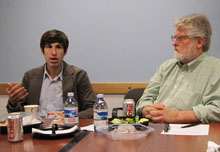Event
The Nation’s Ari Berman sees ‘tidal wave’ for Democrats

October 19, 2010 — Tracing the path of the Democratic Party from the sweep of the 2008 elections to the possible “tidal wave” facing the 2010 midterm elections, Ari Berman, political correspondent for The Nation, spoke to the Shorenstein Center about his new book, Herding Donkeys: The Fight to Rebuild the Democratic Party and Reshape American Politics.
Berman said that he was struck by two things after the 2008 election: one was the way the Democrats were able to “cobble together an expansive, big-tent majority,” and win in unlikely places. The other was the “grassroots political operation that came through the Obama campaign and his unique ability to inspire” large groups of people.
Obama built on Howard Dean’s innovative campaign strategies, Berman pointed out, while Hillary Clinton ignored them. Obama then was able to create an “alternate power base” that involved “bottom-up participation fused with the top-down political structure.”
Instead, Obama ended up relying on government leaders rather than on his grassroots base to help him solve the many problems that faced the administration, Berman said. The health care bill, for example, involved so many “back-room deals,” that it almost felt like a “legislative failure” to Obama supporters, Berman explained.
The Tea Party “hijacked the debate” in August 2009, Berman said, and the result has been “asymmetric warfare.” The Right is mobilized, Berman said, “they know what they want,” but the Democrats need to communicate their accomplishments to the American voters, and mobilize their supporters.
This article was written by Janell Sims and the photos taken by Leighton Walter Kille, both of the Shorenstein Center.